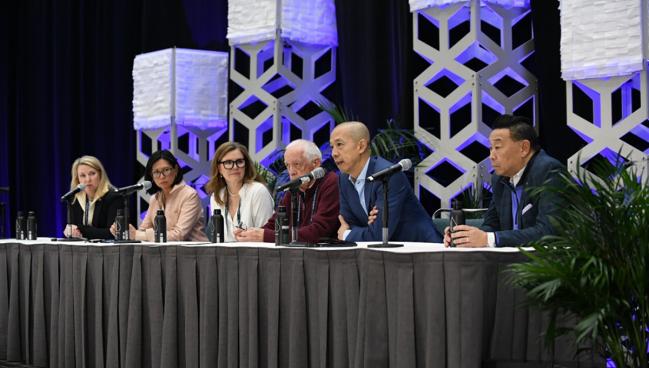Second Annual STS Compensation Survey Finds Gaps Persist By Gender
Task force members say that continued collection of data will help build credibility of what is “fair market value” for surgeons.

Photo credit: STS
LOS ANGELES, CA—In its second annual survey of member compensation, the Society of Thoracic Surgeons (STS) identified gender disparities similar to the ones seen previously and offered new insights into the effects of private equity ownership as well as starting salaries.
Median total compensation went up for almost all surgeons in 2024 compared with 2023. Congenital surgeons still took home the most pay at $990,800 (up 7.8%; 8,000 RVUs) followed by cardiac surgeons at $950,000 (up 5.5%; 11,500 RVUs), those in a hybrid practice at $900,000 (up 3.7%; 12,000 RVUs), and general thoracic surgeons at $697,916 (up 8.5%; 7,000 RVUs). Compensation for transplant surgeons appeared to go down by 11.3% to $687,500, but low numbers muddy interpretation.
“This second survey further confirms the findings of the first survey,” said Michael Mack, MD (Baylor Scott & White Health, Plano, TX), who presented the findings here over the weekend at the 2025 STS annual meeting. “We’re beginning to be able to track trends for the first time. They need to be interpreted with caution.”
Several panel and audience members during the session spoke to how they’ve been able to leverage the 2023 findings to advocate for higher salaries for team members over the past year, but others have faced pushback from their institutions, based on the self-reported nature of the survey.
Mack explained that one of the main reasons STS wanted to conduct its own member-based survey was to become a reliable alternative to other compensation reports, based on small, self-reported groups. These were not “adequately reflecting our true value,” he said, or capturing “all the nuances.”
The plan is to redo the survey annually, he stressed.
“The more we do it, the more we will establish credibility as a useful tool compared to the other tools out there, and I think the closer we will come to ground truth in terms of being able to adequately and truly accurately assess what our value is and have a meaningful tool,” Mack continued.
Survey Findings
The 44-question survey was sent out to the entire membership of the STS between September 9 and November 3, 2024. The 1,049 people who answered represented a 32% response rate, up 25% from the 838 respondents from the year before.
Cardiac surgeons made up the largest proportion of respondents (46%), followed by general thoracic surgeons (25%), those in a hybrid practice (17%), congenital surgeons (11%), and transplant surgeons (1%).
The gender of respondents (13% female) closely reflects current STS membership (11% female). The majority of respondents identified as white/Caucasian (65%), followed by Asian/Pacific Islander (23%), Hispanic/Latino (7%), multiple ethnicities/other (3%), and Black or African American (2%). Just over half (54%) were employed by a hospital/health system, with 40% employed in academic practice and the remaining 6% in private practice or self-employed.
Surgeon experience was well balanced among respondents, with 17%, 15%, 31%, 28%, and 9% having completed training 0-5, 6-10, 11-20, 21-30, or 31 or more years ago, respectively.
Median compensation was roughly similar across regions, though it was slightly lower for those practicing general thoracic surgery, congenital surgery, or a hybrid in the western US. Overall, surgeons employed by a hospital/healthcare system took home the highest compensation.
Like last year, the survey found stark gender disparities across the board, with females making 66% of what males earn in congenital surgery, 82% in hybrid practice, 83% in cardiac surgery, and 89% in general thoracic surgery.
“This is pretty much the same as it was last year,” Mack said, adding that the STS presidential task force is planning to publish a detailed paper looking into this issue.
In a new addition to the survey, 14% of respondents said their organization was owned by a for-profit company, with 2% saying they were owned or financed by private equity.
In a set of new questions asking about starting salaries, median base salaries for those 2 years or less out of training ranged from $400,186 ($442,000 total compensation) in general thoracic surgery to $575,000 ($600,000 total compensation) in cardiac surgery. These figures jumped from $477,027 ($500,000) for general thoracic and $750,000 ($837,500) in cardiac surgery for those 3 to 5 years out of training.
On a scale of 1 to 5, with 5 being the highest, the average response rate for physicians when asked about their compensation satisfaction was 3.38. Other considerations that respondents said they’d accept in lieu of compensation were autonomy and schedule flexibility (63%), work culture (57%), geography (53%), career advancement/mentorship (30%), and prestige (19%).
‘Fair Market Value’
A stated aim of the STS survey is to provide members with a tool to help increase equity in pay across the specialty.
It’s about encouraging fairness, incoming STS President Joseph F. Sabik III, MD (University Hospitals Cleveland Medical Center, OH), told TCTMD. “I want to make sure that our members have the information that they need when they go negotiate their salary,” he said. “I think it’s important for us to continue to do the survey so we can continue to add to its credibility and make sure we can develop the trust with our administrators in our C-suite, . . . and I hope that it helps our individual members when they go talk about their salary.”
Speaking during the session, Tom Nguyen, MD (Miami Cardiac & Vascular Institute, FL), agreed. “It helps us benchmark compensation and have easy access to fair market value to compare our current salary and potentially the proposed salary. And more importantly, it allows us to have data during negotiations,” he said, adding that negotiating salaries without data can “alienate” administrators.
Yael L. Maxwell is Senior Medical Journalist for TCTMD and Section Editor of TCTMD's Fellows Forum. She served as the inaugural…
Read Full BioSources
Mack M. 2024-2025 STS cardiothoracic surgeon compensation survey: a report of the STS presidential task force. Presented at: STS 2025. January 26, 2025. Los Angeles, CA.
Disclosures
- Mack reports no relevant conflicts of interest.





Comments